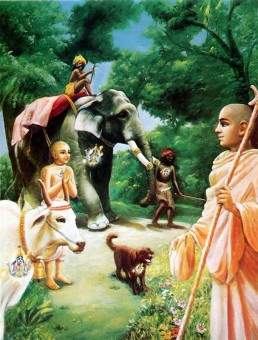It is evident that Arjuna has unconsciously walked out of the neurotic confusions in his mind and has started taking a lively intellectual interest in following the arguments of his friend and beloved comrade. Action being in line with his own nature, Arjuna very joyously and almost instinctively accepts the Path of Action indicated by Lord Krishna in the two previous chapters. Arjuna, however, has not yet grown to be at complete rest with himself. To him there seems to be a repeatedly jarring note in Krishna’s discourse, inasmuch as there is a constant undertone, often very clear, in which Krishna insists that renunciation of action is nobler and diviner than all Yajna-ACTIONS. Hence this enquiry.
Moreover, a patient of hysteria, even when he comes out of it, cannot immediately discover in himself a complete self-confidence. This is generally experienced by everybody. When the dreamer wakes up after a horrible dream, it takes some time for him to compose himself again to sleep. In the same manner, Arjuna, after the shattering experience of his emotional neurosis expressed in the opening stanzas of Chapter II, has not yet found his own balance to develop complete self-confidence and feel capable of discriminating and understanding rightly the learned discourses of the Divine Charioteer. The Pandava Prince concludes that Krishna is giving him a free choice between two independent ways of living — self-less Action and renunciation of Action. He, therefore, requests Krishna to indicate to him decisively one definite path of self-perfection by which he can positively achieve his spiritual fulfilment. This chapter is spent in indicating to the children of the Vedas that these two are not two identical factors to be chosen from, nor are they a complementary pair of equal yoke-fellows.
Renunciation-of-action and full participation-in-action are two different exercises to be practised serially and not simultaneously. This theme is elaborated in this chapter.

